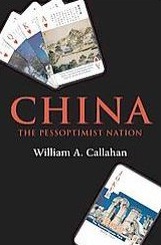
 For those of you looking for an upbeat description of China’s peaceful rise and soft power development you will not find it in China: The Pessoptimist nation. The author, William A. Callahan (Chair in International Politics and Research Director of the University of Manchester’s Centre for Chinese Studies) coins the term ‘pessoptimist’ to describe the combination of positive and negative feelings China has about itself and others. Callahan argues that contemporary China’s national identity is formed from a confused superiority and inferiorly complex that has emerged from its recent economic growth and historical humiliation. Callahan shows that this pessoptimist national identity has serious implications for China’s domestic politics and international relations.
For those of you looking for an upbeat description of China’s peaceful rise and soft power development you will not find it in China: The Pessoptimist nation. The author, William A. Callahan (Chair in International Politics and Research Director of the University of Manchester’s Centre for Chinese Studies) coins the term ‘pessoptimist’ to describe the combination of positive and negative feelings China has about itself and others. Callahan argues that contemporary China’s national identity is formed from a confused superiority and inferiorly complex that has emerged from its recent economic growth and historical humiliation. Callahan shows that this pessoptimist national identity has serious implications for China’s domestic politics and international relations.
Throughout the book Callahan focuses on national humiliation because he feels this phenomenon is more significant in understanding China’s national motivations than examining China’s sense of pride. In his analysis of Chinese identity Callahan utilizes official and commercially produced Chinese sources such as official documents, textbooks, print media, museums, novels, films, television and online materials. He offers a fresh perspective on these sources and determines their importance in generating feelings of national humiliation and its significance for China’s rise or revenge.
In chapter two, China’s state initiated patriotic education policy and national humiliation curriculum are criticized as a “moral campaign that teaches people how and what to feel” (p.194) instead of how and what to think. Callahan argues that textbooks such as Never forget the century of national humiliation and films like the Opium Wars that both portray foreigners negatively can create hatred and the desire for revenge. Although Callahan points out that national humiliation education is not a new phenomenon and was very much part of the nationalist discourse before the establishment of the PRC in 1949; after which class struggle became more important than national humiliation as a definition of Chinese national identity. According to Callahan contemporary patriotic education was revived following Deng Xiaoping’s reaction to the Tiananmen uprising in 1989 with conservatives calling for the re-education of China’s unruly youth. The new education system insists on what Callahan calls a ‘correct view of real China’ that rejects foreign criticisms and perspectives on China’s history.
Supplementing the discourse on national humiliation Callahan discusses the relevance of China’s categorization of identity using binary opposites such as civilized/barbaric, victim/victor, domestic/foreign, hero/villain. In Chapter five, Callahan addresses the problem of assimilation of ethnic minorities into the Han civilization and the obstacles faced by the Chinese diaspora in adapting to non-Han cultures and how this reflects the civilized/barbarian rhetoric. At the end of the chapter he cites Jiang Rong’s novel Wolf Totem as an example where the barbaric nature of the wolf is portrayed as a model for emulation since the barbaric nomads and westerners were successful in defeating and overtaking China in the past. However, Callahan warns against this Darwinian zero-sum logic of violence as a way for conducting China’s foreign policy.
During his examination of Sino-Japanese relations in Chapter six, Callahan describes China’s depiction of the Nanjing massacre as a gendered nationalist historiography. Callahan demonstrates through the use of visual narratives such as graphic photographs in textbooks and museum exhibits that China is presented as feminized victim of Japanese brutality. This cultivated victimization often leads to a raw hatred of Japan among China’s youth and Chinese Diaspora—anti-Japanese sentiments now form a significant part of their Chinese identity.
In his conclusion, Callahan emphasizes the dangers of China’s national humiliation discourse in framing its domestic politics and international relations with “the United States as the evil Hegemon, Japanese as devils, Taiwan as a renegade province, and the Dalai Lama as a ravenous wolf” (p. 194). Callahan cites Chinese sources that regard resolving the problem of national humiliation through the concept of xuechi—alternatively translated as ‘wiping away humiliation’ or ‘revenge’. This is where Deng Xiaoping’s ambiguous statement of “bide our time, while building up capability” taoguang, yanghui becomes all the more pertinent. Despite China’s promise that it will rise peacefully and act as a responsible player in international relations Callahan stresses the importance of recognizing the hawkish voices in China’s leadership and the fact that pessoptimistic nationalism in China is beyond anyone’s control. Therefore he addresses the need for the US and the EU to also adopt a pessoptimistic strategy in response which encourages mutual cooperation while at the same time preparing for China’s possible revenge.
China: The Pessoptimist nation is essential reading for anyone interested in reading a balanced view of China’s rise from the context of nationalist discourse and politically-motivated constructions of historical memory. Pessoptimist is an apt neologism to describe China’s bipolar sense of national identity. The implications of this way of thinking for China’s foreign policy, not just towards the West, Japan or Taiwan but also to the rest of the world are serious and real. As Callahan points out at the close of the book, more public discussion about China’s national identity is needed from Chinese scholars in order to reassure the world that China will not take revenge.
Thomas Glucksmann-Smith is studying East Asian International Relations at the University of Hong Kong.